The Linn County Board of Supervisors has taken a significant step towards regulating nuclear energy in the county by approving the first reading of proposed zoning regulations. The move is seen as a crucial step in determining the future of nuclear development in the area. The proposed regulations aim to provide a framework for the safe and responsible development of nuclear energy in Linn County. The regulations will cover various aspects, including the siting, construction, and operation of nuclear facilities. The board’s decision comes after months of deliberation and consultation with experts, stakeholders, and the public. The proposed regulations have been designed to balance the need for economic development with the need to protect public health and safety. The regulations will require nuclear facilities to meet strict safety standards and undergo regular inspections. The board has also established a set of guidelines for the decommissioning of nuclear facilities, ensuring that they are safely dismantled and restored to their original state. The proposed regulations have been welcomed by some as a necessary step towards embracing nuclear energy as a clean and reliable source of power. However, others have expressed concerns about the potential risks and impacts of nuclear development on the environment and public health. The board’s decision has sparked a debate about the role of nuclear energy in Linn County’s energy mix. Proponents of nuclear energy argue that it can provide a reliable and constant source of power, reducing the county’s reliance on fossil fuels and helping to mitigate climate change. On the other hand, opponents argue that nuclear energy poses significant risks, including the potential for accidents and the production of radioactive waste. The proposed regulations will now undergo a second reading, during which the board will consider feedback from the public and stakeholders. The board has encouraged residents and businesses to provide input on the proposed regulations, ensuring that their concerns and suggestions are taken into account. The final adoption of the regulations is expected to take place in the coming months. The Linn County Board of Supervisors has emphasized its commitment to transparency and public engagement throughout the process. The board has held several public meetings and hearings, providing opportunities for residents and stakeholders to learn about the proposed regulations and provide feedback. The proposed regulations have also been made available online, allowing residents to review and comment on them. The board’s decision has been seen as a positive step towards promoting economic development and job creation in Linn County. The development of nuclear energy facilities is expected to create new employment opportunities and stimulate local economic growth. However, the board has also acknowledged the need to ensure that any development is sustainable and responsible, minimizing its impact on the environment and public health. The proposed regulations will be subject to regular review and update, ensuring that they remain effective and relevant in regulating nuclear energy in Linn County. The board’s decision has been welcomed by local businesses and organizations, which see the development of nuclear energy as a key opportunity for growth and development. The proposed regulations will provide a clear framework for businesses and investors, enabling them to make informed decisions about investing in nuclear energy in Linn County. The board’s commitment to transparency and public engagement has been praised by residents and stakeholders, who appreciate the opportunity to participate in the decision-making process. The proposed regulations have been designed to be flexible and adaptable, allowing for the evolution of nuclear energy technology and the changing needs of the community. The board’s decision has set a precedent for other counties and jurisdictions, demonstrating the importance of regulating nuclear energy in a safe and responsible manner. The proposed regulations will serve as a model for other communities, providing a framework for the development of nuclear energy that prioritizes public health and safety.
